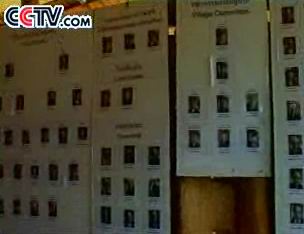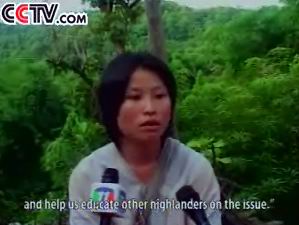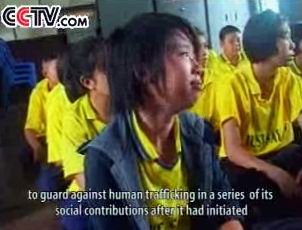Source: CCTV.com
01-20-2007 16:30
Human trafficking has worsened in Thailand, Myanmar, and Laos. As more and more children and women are being bought and sold, organizations are forming anti-trafficking campaigns to teach and educate.
In today's report in our Working Asia Series, Pramote Thitiwangrit from Thailand's NBT, takes a look what's being done to inform today's young people about human trafficking.
 |
In tomorrow's Working Asia Series, we focus on the illegal immigrants sneaking into Singapore for work, and how the country is reacting.
Many children in the remote, mountainous area of Tambon Mae Yao of Muang District in Chiang Rai Province, have been selected to join a new youth’s network with a main activity to monitor human trafficking.
The activity is part of the ILO’s Mekong Sub-Regional Project to Combat Trafficking in Children and Women. The project is carried out in areas where such ethnic tribes as Arka, Lahoo, Paka Kayor, and Mian have long been settled.
Some children have been forced to work in big cities as far as those in the South just to earn better pay.
 |
The Mirror Foundation’s social activist Naruemon Nanti is working with the Youth’s network and educating them on the threat of human traffickers, who lured them to work as prostitutes or forced laborers on ships. She wants to see the youth’s network keep watching and stay alert on human trafficking in their neighborhood.
The network earns revenue from local tourism and uses it to support its activity. The money comes from home-stay service which villagers have offered to tourists, who come to experience hill tribe culture.
Naruemon Nanti said “More and more funds are now raised from many activities. One group of children has sold handicrafts to tourists, who will be also told where their money go. We hope these children would become community campaigners against human trafficking in the future and help us educate other highlanders on the issue,”
Kamolchai Chermuer, a network’s campaign leader, said he was lucky to work with The Mirror Foundation right after he graduated from a junior high school.
But 12-year-old Atiphon Chermuer has a different dream. She plans to further her study at a university. The girl said human trafficking in her neighborhood is quite common; many children could be easily lured to be prostitutes and beggars. What she has done so far is to warn these youngsters not to speak to strangers and always follow parents’ advice.
Atiphon Chermuer said “Just ask friends or parents to warn younger children not to believe those strangers.”
Local schools are considered as a main ally to stop this immoral business as they could help educate students on human trafficking threats and protect the junior-high graduates against the tricks of ill-minded traffickers.
 |
At Ban Mae Jan School, students are also taught on how to make desserts and do metal welding, which are expected to be their future careers. At the same time, they also learn about the threats of human trafficking through joining such activities as broadcasting the school radio, writing bulletins, holding exhibitions, and performing stage play. These extra curricular have proved to be successful.
However, the rapid spread of urban culture to many traditional communities in the north appeared to fuel human trafficking.
Assoc. Prof. Preecha Upayokin, director of The Center for Academic Services of Mae Fah Luang University in Chiang Rai, said this “new culture” has rocked the faith of many people in Lan Na customs, which had long served as a set of moral practices in the neighborhood. This allows local human trafficking to easily grow and, he said, it was so sad to see some children being lured to be prostitutes.
International Labor Organization has once again given a great support to the school activities to guard against human trafficking in a series of its social contributions after it had initiated “Thai Women of Tomorrow Project” when it financed a local research on ways to solve child prostitutes in northern Thailand.
As materialism has found its way to remote areas in the north, more children would be at risk of becoming victims of the traffickers. But, at least, Ban Mae Jan School has laid the foundation for students to be aware of this dreaded approach and they have also been equipped with better knowledge to become effective laborers of the nation.
Editor:Du Xiaodan
